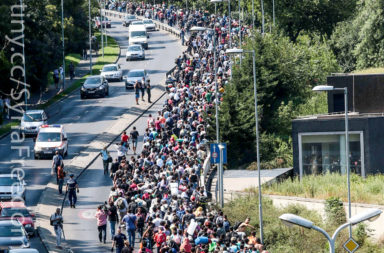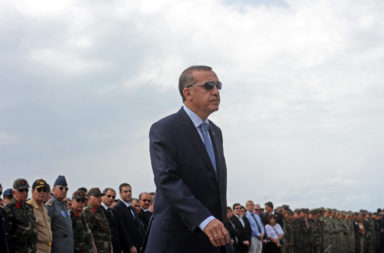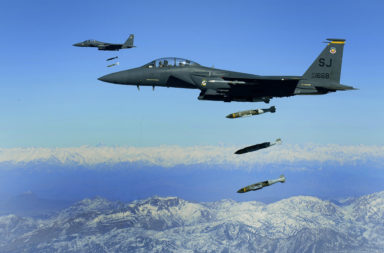The crisis surrounding Turkey’s political campaigning in Europe is threatening to derail NATO and embolden Vladimir Putin to new heights.
- NATO allies reach new low in relations after the Dutch government barred Turkey’s foreign minister from flying to the country.
- Turkey’s President Recep Tayyip Erdogan accused the Dutch government of acting like “fascists” and “Nazi remnants”.
- What does Russia stand to gain?
Another day, another blow to Euro-Turkish relations. After extraordinary reports of Turkish diplomats being escorted to the the Dutch border and flag replacements outside the Netherlands embassy in Instanbul, we ask: is NATO under too much pressure and infighting to mount a challenge to buoyant Russia?
The diplomatic spat first started on Friday after Dutch officials said they would not sanction a visit by Foreign Minister Mevlut Cavusoglu to speak at a political rally in Rotterdam over the weekend.
It is illegal in the Netherlands to hold rallies involving another country’s politics, however the rally was reportedly building support among 300,000 Turkish expats for a referendum to give Turkey’s president Tayyip Erdoğan a wider range of powers.
On Saturday, the Dutch government withdrew landing permission for Cavusoglu’s plane, citing “risks to public order and security”.
“They are Nazi remnants, they are fascists.”
Turkey’s response was decisive, in response they summoned the Dutch envoy to Ankara in protest over the ban, while Erdogan promising retaliation.
“You can stop our foreign minister’s plane all you want, let’s see how your planes will come to Turkey from now on,” Erdogan told a rally of supporters.
“They are Nazi remnants, they are fascists.”
The diplomatic actions in Netherlands have generated outrage in Turkey, where a man climbed the roof of the Dutch consulate in Istanbul and replaced the Netherlands’ flag with the Turkish one.
TV footage showed a man standing on the roof shouting Allahu Akbar, “God is great.” A group of men waving Turkish flags are seen outside the consulate building shouting “Damn Holland” and “Racist Holland.”
The man is still unidentified while the consulate later restored the Dutch flag.
Netherlands Prime Minister Mark Rutte called Erdogan’s remark comparing the Dutch to the Nazis “crazy”.
“I understand they’re angry, but this, of course, was way out of line,” he said.
A Tense Time for Europe and Turkey
This latest international spat comes at a tense time for the Netherlands, who stand on the brink of a March 15 election for the lower house of parliament.
In a campaign defined by identity, migration and employment issues, many are predicting strong gains for anti-Islam candidate Geert Wilders who follows in the populist, isolationist trend preceded by Brexit and last year’s Trump victory.
As for Turkey, there are considerable suspicions that Erdogan is taking advantage of fears stoked by the failed coup attempt in July in order to generate support for a sterner authoritarian system that will provide less checks on his power inside the Turkish state.
“As far as the Turkish government is concerned, they couldn’t be happier than they are today. It’s clearly an attempt to escalate the conflict,” journalist Andrew Finkel told Al-Jazeera.
“It’s a case of clear short-termism. They’re trying to play this national card – much in the way that Geert Wilders is playing the nationalist card. But of course, what happens the day after that … Nobody is really thinking about that, because Europe is very important to Turkey.”
Russia Watches with Glee
If anyone has reason to be cheerful in 2016, it is Vladimir Putin.
As principle antagonist to Europe and Russia a regional rival to Turkey, with huge vested interests in both Syria and the ongoing political turmoil in Europe, further division and distrust among his coalition of enemies will only embolden the Russian leader to force his authority that much further.
Many see NATO, the defensive alliance of North American and European countries that includes Turkey, as Europe’s only strong deterrent to Russian aggression.
This alliance is under duress, however. Political infighting and confusion caused by populist national movements in the UK, France, Netherlands and Greece threaten to leave Europe’s line of defense weak and unable to counter an organised, authoritarian Russia.
As the feud continues, Putin will certainly be keeping a close eye on the tit-for-tat war engulfing European-Turkish relations.
Photo Credit: Flickr





